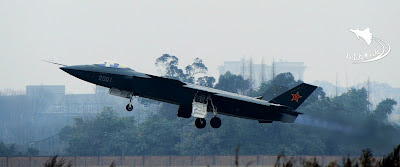China's High-Tech Military Threat and Air Sea Battle
[I]n November 2011, the Pentagon conducted an unusual rollout of a new military unit called the Air Sea Battle Office...
The concept calls for the Air Force, Navy, and Marine Corps to integrate forces and other capabilities to defeat what the Pentagon has labeled “anti-access and area denial weapons” — high-technology arms that can prevent or deter the United States military from operating in certain areas...
When pressed on the question of whom the initiative was targeting, one official responded, “The concept isn’t about a specific actor; it’s about countering anti-access, area-denial capabilities...”
[T]he Air Sea Battle Concept is the culmination of a strategy fight that began nearly two decades ago inside the Pentagon and U.S. government at large over how to deal with a single actor: the People’s Republic of China...
The reluctance to publicly identify Chinese belligerence as the impetus for the concept is merely a ruse to mollify adherents of a “Benign China” school of foreign policy — the losing side of the long internal policy fight.
The ideological godfather of the benign-China school is Harvard professor and former Clinton administration defense policymaker Joseph S. Nye. In 1995, Nye put forth the notion that if the United States treated China as a threat, it would become a threat.
Nye, who is also one of the progenitors of the soft-power school of policymaking now adopted by Secretary of State Hillary Clinton, has called the notion of a threatening China a self-fulfilling prophecy only warmongers and defense contractors would or could celebrate.
The Gertz article continues by describing the battle for leadership between the "Benign China" and "realist" China schools of thought.
For more information on this issue, please consider reading another Gertz article: Panda War.
Photo credit: ChineseDefence.com




Comments
So deficit spending and using trillions from China to plot war against China, is there any place outaide of DC where this "logic" makes sense?
http://battleland.blogs.time.com/2012/06/27/the-perfectly-ironic-chinese-foreign-direct-investment/
The important thing seems to be that others would feel inferior. Chinese, yea right, they will only fight harder. China is winning, US already feels inferior, even in previous comments.
In the book "Unrestricted War", Qiao Liang "criticized Slobodan Milosevis for 'playing by the rules' against the US in Kosovo." "He should have used the rules of "Unrestricted Warfare"and sent surface-to-air missile teams into Western Europe to attack NATO planes as they took off from air bases" (Thomas, 2009).
It also seems to support what Qiao Liang and Wang Xiangsui commended the U.S. on in the book by saying "The emergence of the 'Reorganization Act' in the United States and the effects it produced in the US military are food for thought, and any country which hopes to win a war in the twenty-first century must inevitably face the option of either 'reorganizing' or being defeated. There is no other way." (Thomas, 2009)
Thanks for sharing, Richard.
http://www.fairobserver.com/360theme/understanding-airpower-modernization-south-korea